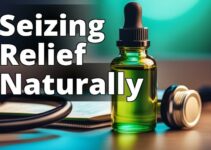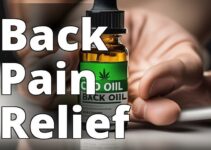What readers will learn:
- Understanding the symptoms of PTSD and its impact on daily life.
- The potential therapeutic properties of CBD oil for PTSD recovery.
- How to choose the right CBD oil and incorporate it into a comprehensive treatment plan.
Understanding PTSD and its Symptoms
Post-traumatic stress disorder (PTSD) is a debilitating condition that affects millions of people worldwide. Characterized by intense anxiety, flashbacks, and nightmares, PTSD can significantly impact an individual's quality of life. While traditional treatments for PTSD, such as medication and psychotherapy, have shown some effectiveness, there is a growing interest in alternative therapies that may offer additional benefits. One such therapy that has gained attention is CBD oil.
CBD Oil: An Introduction and Mechanisms of Action
CBD oil, short for cannabidiol oil, is derived from the cannabis plant. Unlike its counterpart, THC (tetrahydrocannabinol), CBD does not produce psychoactive effects or the feeling of being “high.” CBD oil is typically extracted from hemp plants, which contain low levels of THC.
CBD oil has gained popularity in recent years due to its potential therapeutic properties. It interacts with the body's endocannabinoid system (ECS), a complex network of receptors and neurotransmitters that help regulate various physiological processes, including mood, pain perception, and stress response.
The exact mechanisms of action by which CBD may alleviate PTSD symptoms are still being studied. However, research suggests that CBD interacts with serotonin receptors, which play a crucial role in mood regulation. By modulating serotonin levels, CBD may help reduce anxiety and improve mood in individuals with PTSD.
Furthermore, CBD has been shown to have anti-inflammatory and neuroprotective effects, which may contribute to its potential benefits for PTSD recovery. These properties make CBD oil an intriguing option for individuals seeking alternative treatments for PTSD.
Scientific Evidence and Research on CBD Oil for PTSD
The potential therapeutic benefits of CBD oil for PTSD have garnered significant interest among researchers. Several studies and clinical trials have investigated the effects of CBD oil on PTSD symptoms, providing valuable insights into its efficacy.
One study published in the journal Frontiers in Pharmacology examined the use of CBD oil in individuals with PTSD. The study found that CBD may be effective in reducing symptoms of PTSD, with 91% of patients experiencing a decrease in symptom severity after 8 weeks of treatment[^1]. CBD was generally well-tolerated, and it may also have a positive effect on nightmares associated with PTSD. However, further research is needed to confirm these findings due to limitations in the study design.
Another study conducted by the Multidisciplinary Association for Psychedelic Studies (MAPS) explored the use of cannabis blends with specific THC and CBD concentrations for treating PTSD in veterans[^3]. The study found that these cannabis blends were beneficial for PTSD treatment, supporting the use of cannabis as an alternative therapy. However, further research is needed to determine optimal doses and mitigate potential risks.
While the current research on CBD oil for PTSD is promising, it is important to acknowledge the limitations of the existing studies. Many studies have small sample sizes and may not be randomized controlled trials. Additionally, the optimal dosage and long-term effects of CBD oil for PTSD are still being explored. Further research is needed to establish the efficacy and safety of CBD oil as a treatment option for PTSD.
How CBD Oil Alleviates PTSD Symptoms
CBD oil may alleviate PTSD symptoms through various mechanisms. Let's explore some of the specific ways CBD oil may be beneficial for individuals with PTSD:
Anxiety Reduction and Relaxation
Anxiety is a hallmark symptom of PTSD. CBD oil may help reduce anxiety by interacting with receptors in the brain that regulate fear and stress responses. Research suggests that CBD may enhance the inhibitory effects of GABA, a neurotransmitter that promotes relaxation and calmness[^4]. By modulating GABA activity, CBD oil may help individuals with PTSD experience a greater sense of relaxation and reduce anxiety levels.
Improved Sleep Quality and Reduced Nightmares
Sleep disturbances, including insomnia and nightmares, are common among individuals with PTSD. CBD oil may help improve sleep quality by addressing the underlying factors contributing to sleep disturbances. Research suggests that CBD may interact with receptors involved in the sleep-wake cycle and promote better sleep[^4]. Additionally, CBD oil may reduce the frequency and intensity of nightmares, providing individuals with PTSD a better night's rest.
Reduced Hyperarousal and Hypervigilance
Hyperarousal and hypervigilance are symptoms of PTSD characterized by an exaggerated response to triggers and a constant state of alertness. CBD oil may help reduce hyperarousal and hypervigilance by modulating the body's stress response. Research suggests that CBD may lower cortisol levels, a hormone associated with stress[^4]. By regulating the stress response, CBD oil may help individuals with PTSD achieve a greater sense of calmness and reduce hyperarousal.
Enhanced Mood and Emotional Regulation
PTSD often disrupts an individual's mood and emotional regulation, leading to feelings of sadness, anger, and irritability. CBD oil may have mood-stabilizing effects that can help individuals with PTSD manage their emotions more effectively. Research suggests that CBD may boost serotonin levels, a neurotransmitter associated with mood regulation[^4]. By enhancing serotonin activity, CBD oil may promote a more balanced mood and emotional well-being.
It is important to note that while CBD oil may offer potential benefits for individuals with PTSD, it should not be considered a standalone treatment. CBD oil is most effective when used as part of a comprehensive treatment plan that includes therapy, self-care practices, and other evidence-based interventions.
| Ways CBD Oil Alleviates PTSD Symptoms | Mechanism of Action |
|---|---|
| Anxiety Reduction and Relaxation | Enhancing GABA activity and reducing fear and stress responses |
| Improved Sleep Quality and Reduced Nightmares | Interacting with receptors involved in the sleep-wake cycle |
| Reduced Hyperarousal and Hypervigilance | Lowering cortisol levels and regulating the stress response |
| Enhanced Mood and Emotional Regulation | Boosting serotonin levels and promoting mood regulation |
Choosing the Right CBD Oil for PTSD Recovery
When considering CBD oil for PTSD recovery, it is essential to choose a high-quality product from a reputable source. Here are some factors to consider when selecting CBD oil:
Types of CBD Products
CBD oil comes in various forms, including full-spectrum, broad-spectrum, and isolates. Full-spectrum CBD oil contains all the natural compounds found in the cannabis plant, including THC (though at legal levels). Broad-spectrum CBD oil contains all the compounds except THC, making it a suitable option for individuals who want to avoid THC entirely. CBD isolates, on the other hand, contain only CBD and no other compounds. Understanding the differences between these types of CBD products can help individuals make an informed decision based on their specific needs and preferences.
Third-Party Testing and Product Transparency
Reputable CBD oil brands should provide third-party lab test results to ensure the quality, purity, and safety of their products. Third-party testing verifies the CBD content and screens for potential contaminants such as heavy metals, pesticides, and residual solvents. Additionally, transparency in product labeling, including clear dosage information and ingredient lists, is crucial for consumers to make informed choices.
Reputable CBD Oil Brands and Dosing Guidelines
Choosing a reputable CBD oil brand is essential to ensure product quality and consistency. Look for brands that have positive customer reviews, transparent manufacturing processes, and a commitment to product safety. It is also recommended to start with a low dosage of CBD oil and gradually increase as needed. Consulting with a healthcare professional can help determine the appropriate dosage based on individual factors such as body weight, metabolism, and the severity of PTSD symptoms.
Incorporating CBD Oil into a Comprehensive Treatment Plan
CBD oil should be viewed as a complementary therapy rather than a standalone treatment for PTSD. It is best used as part of a holistic approach to PTSD recovery. In addition to CBD oil, individuals with PTSD may benefit from other evidence-based treatments such as therapy (cognitive-behavioral therapy, eye movement desensitization and reprocessing), exercise, and self-care practices.
Therapy, in particular, can help individuals address the underlying causes of PTSD and develop coping strategies to manage symptoms effectively. Combining therapy with CBD oil may provide a more comprehensive and personalized approach to PTSD recovery.
It is crucial to consult with a healthcare professional before starting CBD oil or making any changes to existing treatments. A healthcare professional can provide personalized advice, monitor potential interactions with other medications, and ensure the safety and efficacy of CBD oil as part of an individual's treatment plan.
Case Study: Sarah's Journey to PTSD Recovery with CBD Oil
Sarah, a 32-year-old army veteran, had been struggling with post-traumatic stress disorder (PTSD) for several years. The trauma she experienced during her service left her with debilitating symptoms, including severe anxiety, nightmares, and hyperarousal. Despite trying various therapies and medications, Sarah found little relief from her symptoms, and her quality of life continued to suffer.
Desperate for a solution, Sarah began researching alternative treatment options and came across CBD oil. Intrigued by its potential therapeutic properties, she decided to give it a try. With the guidance of her healthcare professional, she started incorporating CBD oil into her daily routine.
Within a few weeks, Sarah noticed a significant improvement in her symptoms. The anxiety that had once consumed her began to subside, allowing her to feel more at ease in social situations. The nightmares that plagued her nights became less frequent, and she started experiencing more restful sleep. The constant state of hyperarousal started to fade, replaced by a sense of calm and control. Sarah's overall mood and emotional regulation also improved, allowing her to engage more fully in her daily activities and relationships.
Sarah's success with CBD oil as part of her comprehensive treatment plan for PTSD has been life-changing. It has provided her with a newfound sense of hope and empowerment, allowing her to reclaim her life from the grips of PTSD. With the combination of therapy, exercise, and self-care practices, CBD oil has become a vital tool in her journey to recovery.
Sarah's story is just one example of how CBD oil can be a game-changer for individuals struggling with PTSD. While it may not be a cure-all, it has the potential to alleviate symptoms and improve quality of life for many. As with any treatment, it is essential to consult with a healthcare professional to determine the right approach for each individual.
Safety Considerations and Potential Side Effects
While CBD oil is generally considered safe, it is not without potential side effects. Common side effects of CBD oil may include drowsiness, dry mouth, changes in appetite, and diarrhea. CBD oil may also interact with certain medications, so it is important to discuss its use with a healthcare professional to avoid any potential drug interactions.
In conclusion, CBD oil shows promise as a potential game-changer in PTSD recovery. The scientific evidence suggests that it may help alleviate symptoms such as anxiety, sleep disturbances, hyperarousal, and mood dysregulation. However, further research is needed to fully understand its efficacy and safety for individuals with PTSD. When considering CBD oil as a treatment option, it is important to choose a high-quality product, consult with a healthcare professional, and incorporate it into a comprehensive treatment plan that includes therapy and other evidence-based interventions. With the right approach, CBD oil may offer a valuable addition to the toolkit of treatments for individuals on the path to PTSD recovery.
Answers To Common Questions
Who can benefit from CBD oil for PTSD recovery?
Individuals suffering from PTSD can benefit from CBD oil.
What are the potential benefits of CBD oil for PTSD recovery?
CBD oil may help reduce anxiety and improve sleep in PTSD patients.
How does CBD oil work for PTSD recovery?
CBD oil interacts with the endocannabinoid system to promote relaxation and stress relief.
What if I'm already taking medication for PTSD? Can I still use CBD oil?
It's important to consult with your healthcare provider to ensure CBD oil won't interfere with your current medications.
How should I use CBD oil for PTSD recovery?
Start with a low dose and gradually increase as needed. Follow the instructions provided by the manufacturer.
What if CBD oil doesn't work for my PTSD symptoms?
CBD oil may not be effective for everyone. It's important to explore other treatment options and consult with a healthcare professional.
Dr. Elizabeth Thompson is a licensed clinical psychologist specializing in trauma and PTSD recovery. With over 15 years of experience in the field, Dr. Thompson has worked extensively with individuals who have experienced various types of trauma, including military veterans, survivors of natural disasters, and victims of domestic violence. She holds a Ph.D. in Clinical Psychology from a reputable university and has conducted several research studies on trauma-focused interventions.
Dr. Thompson's expertise in trauma psychology and her passion for incorporating innovative approaches into her practice led her to explore the potential benefits of CBD oil for PTSD recovery. She has closely followed the emerging scientific research on CBD oil and its effects on mental health, particularly in relation to anxiety and sleep disorders.
As a respected member of the mental health community, Dr. Thompson frequently presents her findings at national conferences and has published numerous articles in reputable journals. She is committed to providing evidence-based information to help individuals with PTSD make informed decisions about their treatment options.




